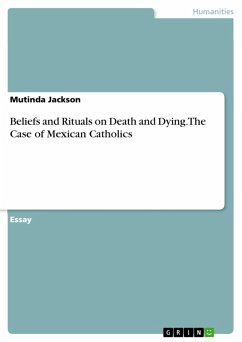Essay from the year 2018 in the subject Sociology - Work, Profession, Education, Organisation, grade: A, Kenyatta University, course: sociology, language: English, abstract: On top of understanding the rituals and beliefs of death, burials, mourning and memorialization of the dead and afterlife beliefs among the Mexican Catholics, this paper will also be providing further insights concerning how these people perceive the presence of the dead and how they evade or accept the realities of death. Beliefs and rituals of death, burial and their significances, and the after death happenings, plus, the living and non-living connection remain to be focal, among all major cultural and even religious traditions. In this sense, the rituals and beliefs behind grieving and death vary from one culture to another, and they are often highly influenced by religion. Evidently, the Mexican culture has been observed to have a unique fascination with this aspect; a relationship that has generated myriad meanings, practices and attitudes concerning death across history, not to mention that it has also contributed to the building of the Mexican state and its respective culture; becoming a constituent of the national symbol. The distinct Mexican holidays' expressions are normally reflected in the yearly religious and civic, alongside historical calendars. The primary demonstration of the relationships between death culture, holidays and the Mexican identity is the Day of the Dead, which is celebrated every year on 2nd November. While the population's majority is considered to be catholic, it has been noted that religious syncretism, which dates back to the Spanish invasion and colonization, is mirrored during these holidays.
Dieser Download kann aus rechtlichen Gründen nur mit Rechnungsadresse in A, B, BG, CY, CZ, D, DK, EW, E, FIN, F, GR, HR, H, IRL, I, LT, L, LR, M, NL, PL, P, R, S, SLO, SK ausgeliefert werden.









